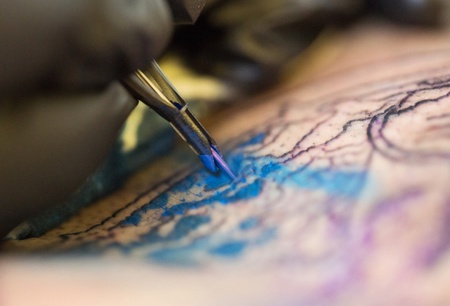Russell Williams, Senior Lecturer in Management at the University of Aberdeen Business School, leads the undergraduate and postgraduate modules on Marketing Management where the topic of managing service encounters frequently comes up for discussion. In this blog entry Russell discusses our changing perceptions of people with tattoos and whether this impacts on how organisations manage customer relations.
Question: What do US Presidents Andrew Jackson and Teddy Roosevelt, wartime Prime Minister Winston Churchill, Inventor Thomas Edison, RH Macey (founder of the famous US store), and author George Orwell all have in common?
Answer: They all had tattoos.
Yes, that is right they were “inked”, although in the case of Winston Churchill there is some question over his alleged anchor tattoo.
Over the last decade, tattoo ownership and display has become much more widespread. But, whilst it is common to see sports and music stars openly wearing them, they have crossed over into something of the mainstream. For example, Canadian Prime Minster Justin Trudeau has been seen jogging with his tattoos on display and here in the UK the former UK Prime Minister’s wife Samantha Cameron has been seen showing her dolphin ankle tattoo.
It seems displaying a tattoo barely raises a (possibly tattooed) eyebrow! But, what do people really think about tattoos on others? Specifically, in the business domain, what are consumers' attitudes toward visibly tattooed employees, or what are recruiters’ attitudes to potential job applicants with visible tattoos?
You may be surprised to learn that there is considerable research in this area, some of which indicates the following:
First, a similarity effect may be at work. You may be more accepting of a tattoo if you also have a tattoo. Indeed, research reports that people with a tattoo trust salespeople more than people without a tattoo.
Second, age may play a role. Younger people who have grown up with tattoos being more widely displayed may be more accepting of tattoos.
Third, the occupation of the tattooed employee you are interacting with may be important. So, if your barber or hairdresser have a tattoo that may be okay. But, alternatively, if your financial advisor has a tattoo that may be less okay. Why? It seems that we associate certain attributes with tattoos (rightly or wrongly). For example, one association may be creativity, which is okay for a barber or hairdresser. Alternatively, another association may be impulsiveness, which is perhaps less okay for a financial advisor. Remember though, the impact of these associations may be reduced if you have a tattoo and you are younger.
Does all this matter? Potentially, yes!
Even if visible tattoos are becoming more prevalent and more accepted, if some negative attitudes towards tattoos still exist, organisations will need to get the balance right between an individual’s rights to self-expression and the desire to manage their customers’ perceptions of the service encounter, and indeed their brand image. There is so much to discuss here…. Moreover, we have not even began to talk about body piercing or facial hair!
Let us know what you think? would a person with a tattoo impact on your perception of them or the company they represent?


